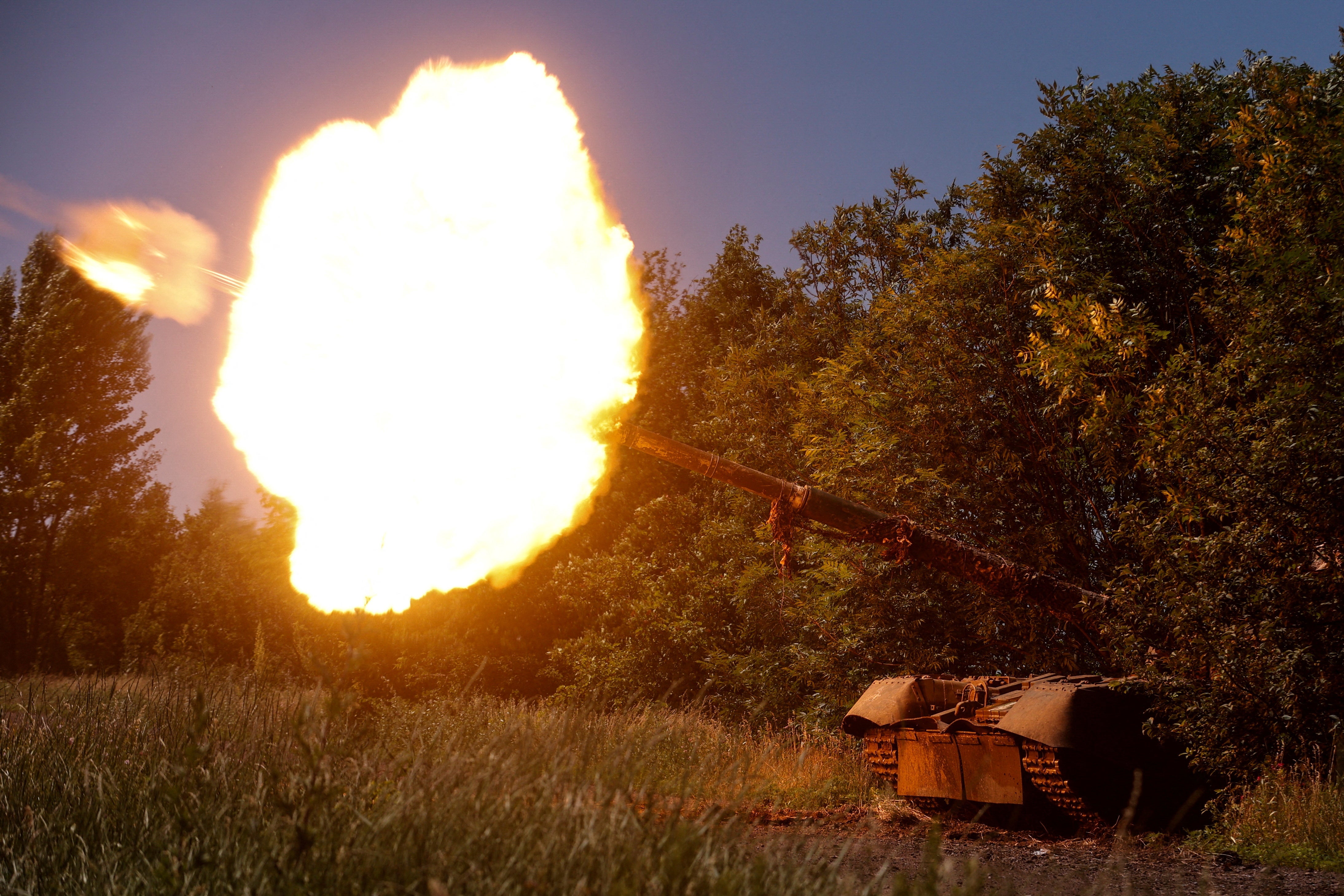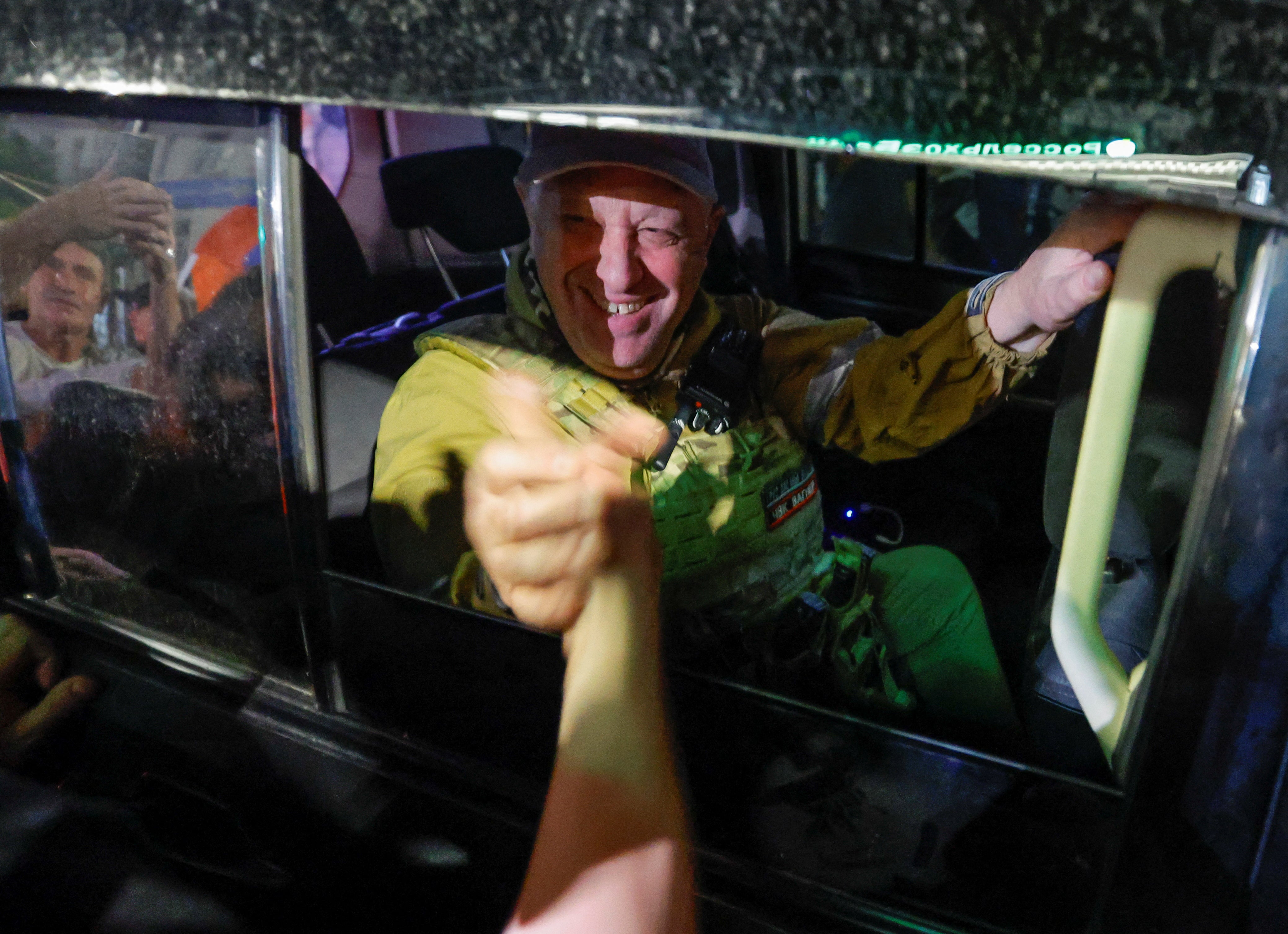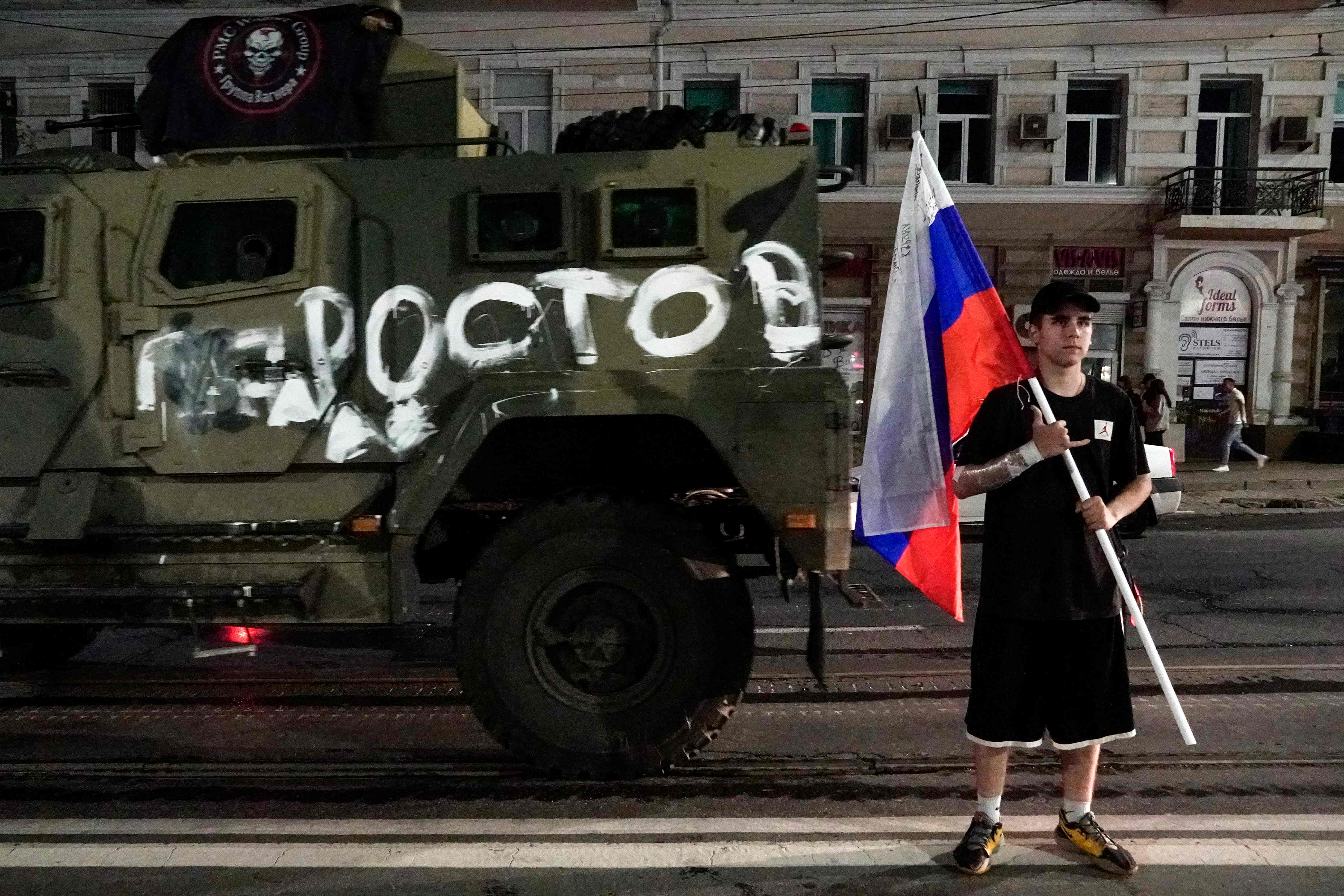Ukraine says Wagner’s mutiny proves Putin’s fragility – but this war ends on the battlefield
Officials believe any fear of Putin preventing Western states from delivering key weaponry had been smashed – and that it is crucial Ukraine keep receiving support from allies. Bel Trew reports from Kyiv


The silence is deafening.
On Saturday, Yevgeny Prigozhin, a Russian hotdog-seller turned mercenary, was firing off expletive-riddled voice notes and videos every other hour that were being broadcast across the world.
In them, the chief of Wagner Group, a powerful private military company (PMC), blamed the Russian Ministry of Defence for bombing his troops in Ukraine’s eastern Donbas region. He accused them of lying to his country about the motivations for going to war in Ukraine, and he vowed to get revenge.
Unimpeded he and his forces – which are 25,000 strong – crossed from Ukraine to Russia and seized control of the southern city of Rostov, the main military logistics hub for Russia’s forces in their invasion of Ukraine. They shot down multiple Russian helicopters that tried to stop their 1000km (620 miles) march on Moscow. A slew of videos were posted online showing a massive column of his Wagner forces – including tanks mounted on trucks, Pantsir missile systems, and artillery that Mr Prigozhin had stockpiled – moving within 200km (125 miles) of the Kremlin.
And perhaps more worrying was their proximity to other key locations like Borisoglebsk – a town he passed in the Voronezh region – which is believed to be home to one of Russia’s key nuclear depots.
Very quickly a panicked Vladimir Putin himself responded with charges of treason and armed mutiny. All of a sudden it seemed that Russia was teetering on the edge of a bloody civil war that could cause a problem for the world. What would happen in a showdown between Mr Putin backed into a corner and a crazed billionaire warlord with access to a nuclear stockpile?
Then as soon as it started, it appeared to end. In exchange for immunity, Mr Prigozhin agreed to exile in Belarus claiming he wanted to stop “bloodshed”. His forces dutifully went back to Donbas. He was last photographed getting into a vehicle late on Saturday.
Since then he hasn’t said a word. Excerpts from an interview with Mr Putin were aired by Russian state television on Sunday, but it appeared to have been recorded before the mutiny and he made no reference to Saturday’s events. In them, he said he was giving top priority to his invasion of Ukraine.

The world was left asking what, on earth, just happened?
No one truly knows what went on behind the scenes. But for the Ukrainians – who watched with amused trepidation – the last 24 hours have proven to the world the fragility and weakness of Mr Putin and – they say – the fallacy of the Western argument that if they give too much military support to Kyiv they risk igniting a Third World War.
As one top official put it to me: “The future of Russia changed dramatically in one day, there is a new security world order.” The fear of Mr Putin as the “big bad wolf” preventing Western states from delivering key weaponry had been smashed.
Defence ministry officials also hope that Saturday’s debacle ends the notion that an internal crisis within Russia could hasten the end of the war, rather than a Ukrainian military victory.
“The only way to restore peace, to protect Europe is to make sure Ukraine defeats Russia on the battlefield,” Yuriy Sak, a defence ministry adviser, told The Independent.
“This is why it is crucial that Western allies continue to provide us with military support – this is why it is crucial that we get the F16s fighter jets as soon as possible,” he added.

The only other certainty from Saturday’s mess is that this hails the end of Wagner, at least as we currently know it. Wagner is a private Russian army with a storied history in Ukraine, Libya, Syria, Sudan and other parts of the world. It was an essential asset for Mr Putin at the beginning of his invasion of Ukraine but became a thorn in his side because of Mr Prigozhin and his video rants.
“Even if Prigozhin will succeed in taking people close to him to Belarus, it will not be the Wagner we knew before, it will be a band of armed men,” says Tatiana Stanovaya, a Russian expert on Wagner and senior fellow at the Carnegie Russia Eurasia Center.
“Prigozhin appears to be out of the Russian political game, and Wagner – as an organisation with a mandate from the Kremlin – will also disappear.”
And that in some ways is a win for Mr Putin. Wagner started out as the Kremlin’s long arm in its initial invasion of eastern Ukraine in 2014 – a way for Russia to exert power and enact change while retaining plausible deniability. For a long time, Mr Prigozhin (who started out as Mr Putin’s caterer) denied involvement and even won a defamation lawsuit against a journalist who had publicly named him as the group’s founder.
The organisation began to play strategic roles in many of Russia’s proxy conflicts, until February 2018 when it got in trouble for engaging in a full-scale battle with US forces in Syria, and its wings were clipped. After that their activities were curtailed and the term Wagner morphed into a catchall phrase for a slew of nebulous PMCs.
That all changed in February 2022 when Putin launched the invasion of Ukraine and needed Wagner to help hold one of the bloodiest lines in the war: the Donbas front.
It was successful at first until Mr Prigozhin built himself an adoring fanbase on Telegram, where he would frequently rage about lack of ammunition and the stupidity of Moscow’s generals.
Russia attempted to bring Wagner under the umbrella of the defence ministry, and that apparently sparked the last desperate march on Moscow.
Former Wagner soldiers have told The Independent that although Mr Prigozhin was a “skilful manipulator” who terrorised his men into submission, his power had started to wane in recent months, and his fighters may not have been as loyal as he hoped.
“I’ve been observing how his wheels have come off since February, and he started to be disregarded and his power began to decline,” said one disgruntled former fighter who served on the frontline of Bakhmut in the autumn but managed to flee to Europe with the help of dissidents.
“He upset a lot of fighters by only paying 60 per cent of their salaries, so that families were forced to knock on the doors of Wagner PMC to get some money.”
As long as he’s alone, he’s a nobody
Resentment built as he sent the fighters to certain death, “as cannon fodder”, he continued. “There was also constant tension between Wagner and the regular Russian forces. They fought amongst themselves.”
And that is why he thinks that “they will find the corpse of Prigozhin” soon. “As long as he’s alone, he’s a nobody. But when he senses support, he becomes powerful,” the soldier said.
Mr Putin may have weathered this storm for now and will probably be able to get his countrymen back onside. And Mr Prigozhin may well yet have an “unfortunate accident” in Belarus. Wagner as an idea might go with him.
But Saturday’s extraordinary theatre has proven to the outside world, and any internal dissidents, that Mr Putin does not enjoy the monopoly over power he has projected for so long. And that in itself is a game changer.







Join our commenting forum
Join thought-provoking conversations, follow other Independent readers and see their replies
Comments